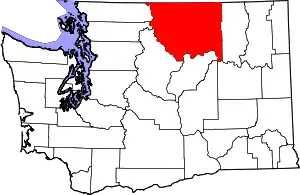Pateros, Washington
Pateros /pəˈtærəs/ pə-TARR-əs is a city in Okanogan County, Washington, United States. The population was 643 at the 2000 census and increased 3.7% to 667 in the 2010 census.
Pateros | |
|---|---|
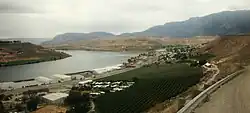 A view Pateros, Washington from northeast of the town | |
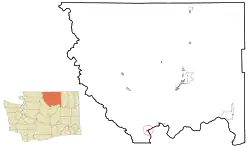 Location of Pateros, Washington | |
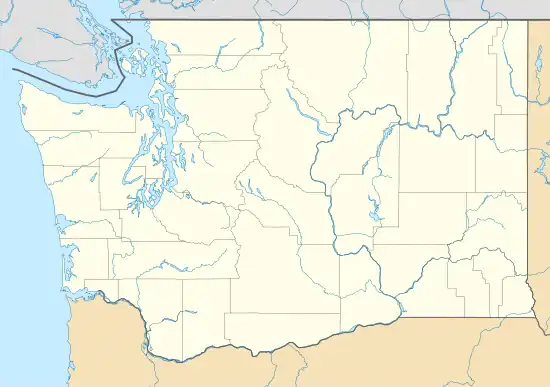 Pateros  Pateros .svg.png.webp) Pateros | |
| Coordinates: 48°3′12″N 119°54′9″W | |
| Country | United States |
| State | Washington |
| County | Okanogan |
| Founded | c. 1886 |
| Incorporated | May 1, 1913 |
| Named for | Pateros, Metro Manila, Philippines |
| Area | |
| • Total | 0.70 sq mi (1.82 km2) |
| • Land | 0.51 sq mi (1.31 km2) |
| • Water | 0.20 sq mi (0.51 km2) |
| Elevation | 804 ft (245 m) |
| Population | |
| • Total | 667 |
| • Estimate (2019)[3] | 714 |
| • Density | 1,413.86/sq mi (546.23/km2) |
| Time zone | UTC-8 (Pacific (PST)) |
| • Summer (DST) | UTC-7 (PDT) |
| ZIP code | 98846 |
| Area code | 509 |
| FIPS code | 53-53720 |
| GNIS feature ID | 1524247[4] |
| Website | City of Pateros |
History
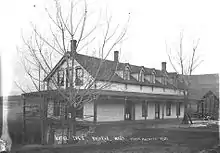

Pateros was originally established as Ive's Landing in around 1886 by Lee Ives.[5] Ives began farming the area near the confluence of the Methow and Columbia Rivers, which was populated by a small band of Native Americans and around 20 Chinese miners. Ives also built an 18-room hotel at the town site and operated a ferry crossing.[6][7] The first post office was built in 1895.
In 1900, Charles Nosler acquired most of the townsite. He renamed the town to Pateros, after a town in the Philippines he previously visited.[7] In 1903, the city consisted of four commercial establishments and nine residences and the town was sold to J.C. Steiner. Steiner vigorously promoted the town, making Pateros the principal rail shipping point between Oroville and Wenatchee. Pateros was officially incorporated on May 1, 1913.
In 1962, the Federal Power Commission granted the Douglas County Public Utility District a 50-year license to build and operate Wells Dam about 8 miles downstream of Pateros.[8] Construction of the dam would flood much of the original city. The Pateros City Council accepted an offer to relocate the town, and the PUD spent about US$1,000,000 on moving or demolishing buildings and improving the town's infrastructure.[9] Wells Dam went into operation in 1967.[8] Despite relocation of the city, the population dropped by almost a third from 1960 to 1970.[10]
Much of Pateros was destroyed by the Carlton Complex wildfire on July 17 and 18, 2014. No injuries or fatalities were reported, but at least 95 homes in the area were reported destroyed, along with at least one business.[11]
Geography
Pateros is located at 48°3′12″N 119°54′9″W (48.053457, -119.902544).[12]
According to the United States Census Bureau, the city has a total area of 0.49 square miles (1.27 km2), all of it land.[13]
Climate
This climatic region is typified by large seasonal temperature differences, with warm to hot (and often humid) summers and cold (sometimes severely cold) winters. According to the Köppen Climate Classification system, Pateros has a humid continental climate, abbreviated "Dfb" on climate maps.[14]
Demographics
| Census | Pop. | Note | %± |
|---|---|---|---|
| 1920 | 412 | — | |
| 1930 | 486 | 18.0% | |
| 1940 | 484 | −0.4% | |
| 1950 | 866 | 78.9% | |
| 1960 | 673 | −22.3% | |
| 1970 | 472 | −29.9% | |
| 1980 | 555 | 17.6% | |
| 1990 | 570 | 2.7% | |
| 2000 | 643 | 12.8% | |
| 2010 | 667 | 3.7% | |
| 2019 (est.) | 714 | [3] | 7.0% |
| U.S. Decennial Census[15] | |||
2010 census
As of the census[2] of 2010, there were 667 people, 238 households, and 162 families residing in the city. The population density was 1,361.2 inhabitants per square mile (525.6/km2). There were 276 housing units at an average density of 563.3 per square mile (217.5/km2). The racial makeup of the city was 76.9% White, 0.1% African American, 3.1% Native American, 17.2% from other races, and 2.5% from two or more races. Hispanic or Latino of any race were 37.8% of the population.
There were 238 households, of which 39.1% had children under the age of 18 living with them, 52.1% were married couples living together, 10.5% had a female householder with no husband present, 5.5% had a male householder with no wife present, and 31.9% were non-families. 26.5% of all households were made up of individuals, and 12.2% had someone living alone who was 65 years of age or older. The average household size was 2.76 and the average family size was 3.27.
The median age in the city was 33.9 years. 30.6% of residents were under the age of 18; 8.8% were between the ages of 18 and 24; 24.6% were from 25 to 44; 24.2% were from 45 to 64; and 11.4% were 65 years of age or older. The gender makeup of the city was 51.9% male and 48.1% female.
2000 census
As of the census of 2000, there were 643 people, 249 households, and 172 families residing in the city. The population density was 1,256.5 people per square mile (486.8/km2). There were 279 housing units at an average density of 545.2 per square mile (211.2/km2). The racial makeup of the city was 77.76% White, 1.40% Native American, 0.31% Asian, 19.28% from other races, and 1.24% from two or more races. Hispanic or Latino of any race were 29.86% of the population.
There were 249 households, out of which 36.1% had children under the age of 18 living with them, 56.2% were married couples living together, 10.0% had a female householder with no husband present, and 30.9% were non-families. 29.7% of all households were made up of individuals, and 14.1% had someone living alone who was 65 years of age or older. The average household size was 2.58 and the average family size was 3.22.
In the city, the population was spread out, with 27.5% under the age of 18, 9.5% from 18 to 24, 27.4% from 25 to 44, 19.0% from 45 to 64, and 16.6% who were 65 years of age or older. The median age was 35 years. For every 100 females, there were 94.3 males. For every 100 females age 18 and over, there were 91.8 males.
The median income for a household in the city was $30,938, and the median income for a family was $39,375. Males had a median income of $30,521 versus $20,208 for females. The per capita income for the city was $13,646. About 9.3% of families and 17.1% of the population were below the poverty line, including 19.7% of those under age 18 and 8.8% of those age 65 or over.
Events
Pateros Hydro Classic
In mid-August Tacoma Inboard Racing Association hosts the "Pateros Hydro Classic." Each year racers come from all over the country to race on Lake Pateros. Hydroplanes fly at speeds up to one hundred and forty miles per hour. They are powered by eight cylinders and are so loud the whole town can hear them. A mile and a quarter liquid oval course is tight for fifty hydroplanes fighting for the gold.[16] The race starts at ten thirty in the morning. Fans watch from the grassy park on the side of the lake which is really the Columbia River. A fireworks display is the finale of a long day of races on the Lake.
Notable people
- Richard Beyer, sculptor
- Ron Terpening, author
References
- "2019 U.S. Gazetteer Files". United States Census Bureau. Retrieved August 7, 2020.
- "U.S. Census website". United States Census Bureau. Retrieved December 19, 2012.
- "Annual Estimates of the Resident Population for Incorporated Places in Washington: April 1, 2010 to July 1, 2019". United States Census Bureau. May 2020. Retrieved May 27, 2020.
- "Pateros". Geographic Names Information System. United States Geological Survey, United States Department of the Interior.
- Majors, Harry M. (1975). Exploring Washington. Van Winkle Publishing Co. p. 50. ISBN 978-0-918664-00-6.
- Robbins, Jefferson. "Dams Drown Towns -- Transplants Struggle to Take Root -- Construction of Rocky Reach and Wells dams left Entiat, Pateros under water". Yakima Herald-Republic. Archived from the original on July 31, 2018. Retrieved July 30, 2018.
- Lemons, Nancy (June 19, 2005). "Finding peace at Pateros". The Spokesman-Review. Retrieved July 30, 2018.
- "Wells Project". Douglas County PUD. Retrieved December 6, 2017.
- Marshall, Jennifer (October 4, 2013). "Pateros centennial marks vast changes". Omak-Okanogan County Chronicle. Retrieved December 6, 2017.
- "Population and Housing Unit Estimates". Retrieved June 9, 2017.
- "At least 95 homes gone in Pateros, Methow Valley fires".
- "US Gazetteer files: 2010, 2000, and 1990". United States Census Bureau. February 12, 2011. Retrieved April 23, 2011.
- "US Gazetteer files 2010". United States Census Bureau. Archived from the original on January 12, 2012. Retrieved December 19, 2012.
- Climate Summary for Pateros, Washington
- United States Census Bureau. "Census of Population and Housing". Retrieved October 4, 2013.
- "Hot Action in Hydroplane Racing at Pateros this Weekend". Bud McKay. Archived from the original on April 6, 2012. Retrieved December 6, 2011.
